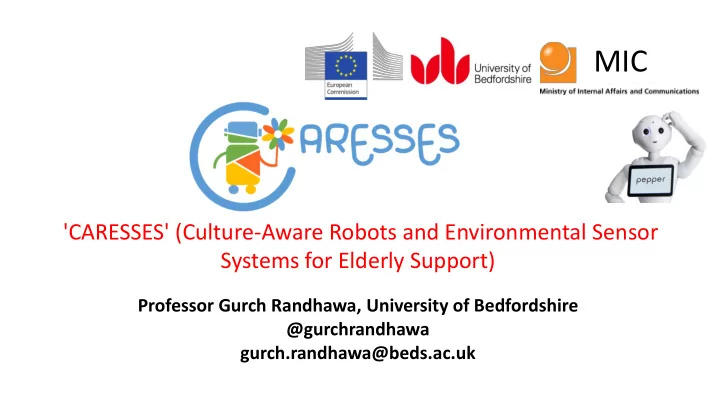

MIC 'CARESSES' (Culture-Aware Robots and Environmental Sensor Systems for Elderly Support) Professor Gurch Randhawa, University of Bedfordshire @gurchrandhawa gurch.randhawa@beds.ac.uk
• CARESSES is an international, multidisciplinary project that started in January 2017 and will end in January 2020. • The CARESSES project is based on the concept of cultural competence , and the theory that when robots take culture into account during their interactions with people, they will be received more positively and will be more likely to be accepted . This is important because without acceptance, no matter how strong or feature rich a robot may be, it will not be used. This is the same for all health interventions; acceptance from users is critical to overall success . From a commercial perspective, the concept could open new avenues for marketing robots across different countries What is CARESSES?
• The concept is motivated by the fact that ageing populations across the world are placing health systems under increasing pressure. • Elderly care robots can be a means to relieve that pressure in hospitals and care homes, as well as a way to improve care delivery at home and promote independent living for the elderly. • This is about exploring the potential of assistive robots, not robots that act as replacement for care. Therefore, this project is not about replacing jobs but attempting to improve the overall the care package • Currently there is a substantial lack of evidence about this, so there is a moral imperative to investigate this and reflect upon what the evidence that is produced. The CARESSES concept
• Therefore, the goals of the project are to design, develop, test and evaluate robots configured to assist care home residents in a culturally appropriate manner. • The robot is programmed with a number of capabilities aimed at complimenting and supporting the care of older adult residents in long term care homes. However, each capability will be performed with attention to the older person’s particular cultural values and preferences The CARESSES project
MIC Nagoya Bedfordshire University Orebro University University JAIST J. Adv. Inst. Advinia Softbank University of Sci. Health Robotics of Genova & Tech. Care Chubu Middlesex University University Robot Testing Health & user Technical technology facility evaluation development The consortium
MIC • The CARESSES AI basically works like this: First, the robot is programmed with an understanding of a particular culture e.g. its customs, traditions, events, the types of food, music, arts, clothes, topics of conversation (and much more) that are valued by most people who identify with that particular culture. It uses this data as a starting point in interactions, both verbal and non-verbal ones. Then, as the robot receives feedback from the user about their personal preferences, values and likes, the robot tailors its programming accordingly for that particular person (only). This enables the robot to move from culture-generic to culture-specific interactions, enabling a personalized, rich experience that avoids stereotypes and enables cultural competence. Early development video demonstrating this AI: https://www.youtube.com/watch?v=WQJ0d5yXD0A&t The CARESSES artificial intelligence
The CARESSES concept
MIC Contact: • If you wish to contact me for further information about this project (which I would very much welcome) my details are: • My email: gurch.randhawa@beds.ac.uk • Twitter: @gurchrandhawa • CARESSES website: http://www.caressesrobot.org/ • CARESSES Facebook: https://www.facebook.com/caressesproject/ • CARESSES Twitter: @caressesproject • CARESSES ResearchGate: https://www.researchgate.net/project/CARESSES-Culture-Aware- Robots-and-Environmental-Sensor-Systems-for-Elderly-Support Thank you
Recommend
More recommend